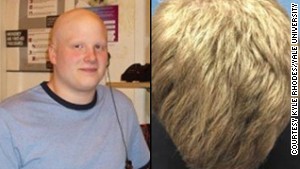In recent years, various researchers have found a strong connection between hair cells and fat cells and their communication with each other. I covered some of this in a post from last year.
Dr. Valerie Horsley
A year or so ago, I bookmarked a video from Dr. Valerie Horsley regarding the link between fat cells and hair cells on the scalp that I wanted to post on this blog, but postponed doing so after visiting the Horsley Laboratory (at Yale University) website and not seeing much on hair loss research developments in the news page. I was waiting to post that video as part of a longer post also covering a recent news development, and today is finally the day. First, since the video cannot be embedded, here is the link to it.
You can also read more about the Horsley Lab’s findings here. Apparently, fat cells in the skin “talk” to hair cells and this communication is necessary to induce hair growth. The lab’s researchers are trying to find ways to re-enable this communication and perhaps grow back hair in balding regions.
Dr. Craig Ziering
Now as far as the recent news development goes, it is not a newspaper item, but rather, an interesting new addition to a well known hair transplant surgeon’s product offerings. Dr. Craig Ziering, who is based in the US, seems to have recently updated his UK website, and one of the pages on there (Edit: no longer there) was quite a surprise to me. Dr. Ziering has apparently invented a trademarked “STEMULATION” device to separate stem cells from extracted body fat, which are then injected into the scalp to aid hair growth. The webpage is not complete yet (a lot of “lorem ipsum” placeholder text in there), and there is not much on the page about studies that support this new procedure. It also seems like the contents of that webpage disappeared and came back and then disappeared yet again and then got moved somewhere else and then disappeared again from the new location (I got some of these updates in the hair loss chat on this site)! I am skeptical about this whole thing, but the EU has given Dr. Ziering a CE Mark that is required to sell or market a medical device.
